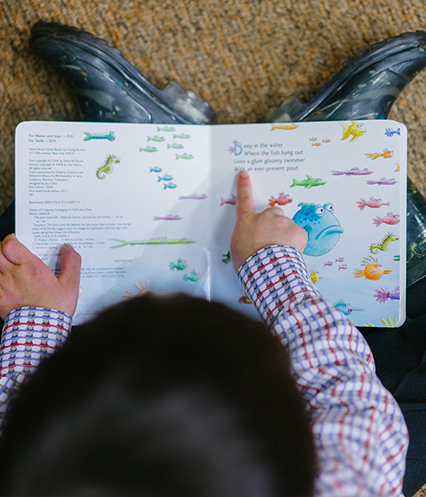Professor Carianne Bernadowski is an expert in children's literacy and knows the best ways to get kids to love books.

Literacy research over the last 30 years has been very clear: Reading to very young children has a profound effect on later reading development. If you want your kids to be good readers, follow these basic steps to support their literacy journey.
Read to them early and often. By reading books aloud to babies, toddlers, and preschoolers, we are modeling what reading is and what proficient readers do. We are teaching them that there are words on the page that have meaning and tell a story, that we read left to right and top to bottom, and that punctuation holds meaning. All of these tenets of emergent literacy are taught before children can read. Regular bedtime stories will instill the love of reading that we hope they will carry for a lifetime.
Read a variety of texts for a variety of reasons. Young children are often quite familiar with narratives that begin with “Once upon a time…” and end with “happily after ever.” Those fairy tales are an important part of a child’s literacy development. To include other texts from a variety of genres, consult our “RMU Recommends” book lists, which we compile each year.
Play rhyming games. To build phonological awareness, ask the child to rhyme words aloud. You provide a word like “cat,” and help your child articulate words that sound the same — bat, mat, splat. Children are naturally drawn to playing with language, and word games are fun.
Read environmental print. Stop signs, restaurant signs, and other words your child knows by sight provide a perfect opportunity to point out letters and the sounds those letters make.
Encourage story writing. Writing is an excellent way for young children to see the connection between reading and writing. Allow your child to draw pictures and tell the story of the picture. Encourage them to write the words using crayons. One scribble could contain an entire story. Keep the stories and watch their progression over time.
Be proactive. Literacy is developmental. Once children reach school age, teachers are important partners in helping determine if children are on target in literacy. You know your child best, so advocating for their education becomes very important. As children age, they can articulate when they are struggling and what is difficult for them to do in reading. If they are struggling with reading, you may also see them struggle in other content areas. If you suspect a reading disability, ask the school district to help determine if this is true. The RMU Peirce Center also can help with more information on reading disabilities.
Carianne Bernadowski is a professor of education and coordinator of the Bob and Joan Peirce Structured Reading Teacher Training Center at RMU. She also coordinates the reading specialist program and secondary education teacher certification in English and communications.
